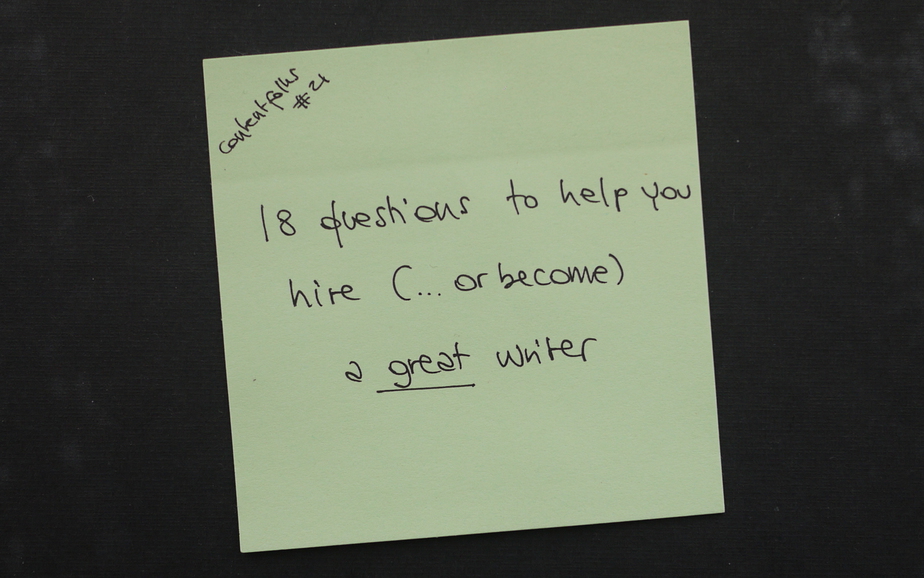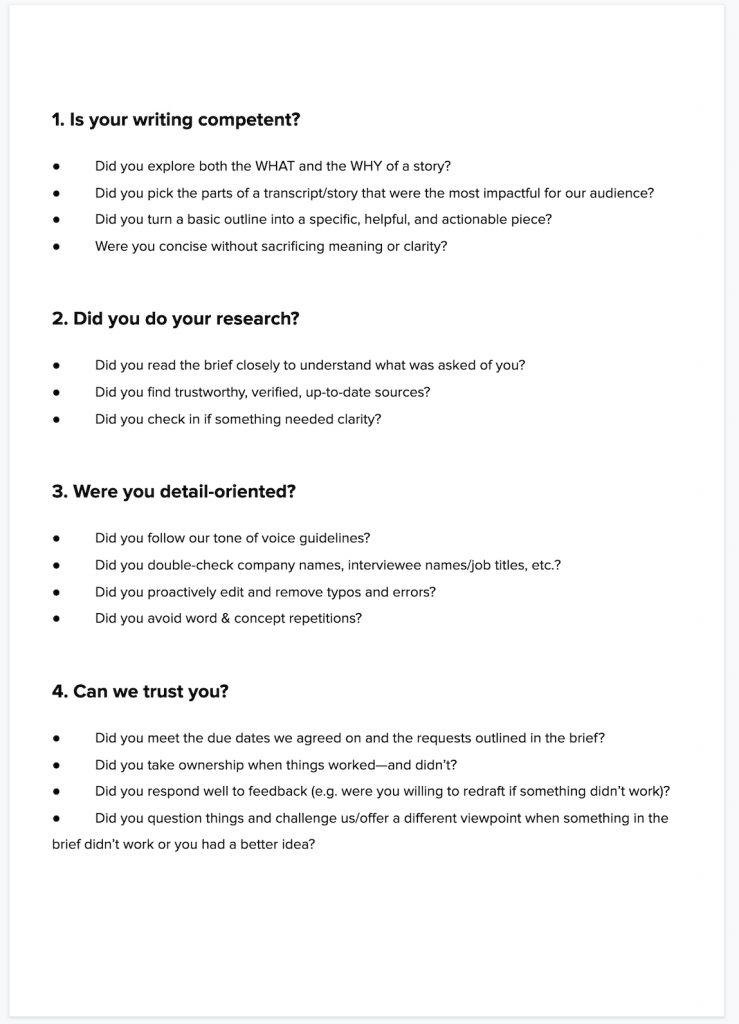
Welcome to contentfolks—a fortnightly newsletter with short lessons & ideas about content that makes a difference, sparks action, and truly serves its audience. Thank you for being here!
Hey 👋
This newsletter will ask more questions than it answers. That’s because I’ll share my go-to list of questions to use when hiring writers (freelance or in house):
If you’re the person doing the hiring, these questions can help you communicate your expectations from the start and remove (some of) your biases from the hiring process
If you’re the person doing the writing, these questions can help you understand what an editor/strategist may be looking for when they’re deciding whether or not to hire you
Knowing what to expect > trying to read each others’ minds 🔮
As an editor/strategist looking to hire new writers, you must be able to explain what counts as ‘good’ content and why a deliverable is, or isn’t, a good fit. Likewise, as a writer hoping for repeat work, you need to know what the hiring person is looking for and how they will evaluate your submission.
…but a lot of this stuff isn’t really made explicit at the beginning of a new writing relationship. We behave as if the other person can read our mind and inevitably get frustrated when things don’t work out.
A much easier way forward is to seek alignment from the start***. For example, if the editor/strategist is proactive and detailed about what they want and communicates this before any writing even happens, the relationship has a better chance to work out.
*** by the way, I suspect this is true of life in general.
💡 A practical example 💡
In recent years, freelance writers who come my way are given a paid task, links to useful information (e.g. style & tone of voice guidelines), and the following one-page list:

I tell each writer to keep this list in mind because we’ll use it to evaluate the final deliverable and decide whether or not to move forward.
Here’s the list:
1. Is your writing competent?
- Did you explore both the WHAT and the WHY of a story?
- Did you pick the parts of a transcript/story that were the most impactful for our audience?
- Did you turn a basic outline into a specific, helpful, and actionable piece?
- Were you concise without sacrificing meaning or clarity?
2. Did you do your research?
- Did you read the brief closely to understand what was asked of you?
- Did you find trustworthy, verified, up-to-date sources?
- Did you check in if something needed clarity?
3. Were you detail-oriented?
- Did you follow our tone of voice guidelines?
- Did you double-check company names, interviewee names/job titles, etc.?
- Did you proactively edit and remove typos and errors?
- Did you avoid word & concept repetitions?
4. Can we trust you?
- Did you meet the due dates we agreed on and the requests outlined in the brief?
- Did you take ownership when things worked—and didn’t?
- Did you respond well to feedback (e.g. were you willing to redraft if something didn’t work)?
- Did you question things and challenge us/offer a different viewpoint when something in the brief didn’t work or you had a better idea?
💡 Bonus questions: if you’re looking to hire an in-house writer or build a long-term content partnership, you can include other elements you value. For example:
5. Do you care about the bigger picture?
- Do you understand the role you play in [company’s] larger business—and if not, are you interested in finding out?
- Are you actively interested in knowing how each piece contributes to moving [company] forward?
- Do you have the ability and interest to get to know our audience so you can write well for them?
🔥 Pro tip for writers: these questions are written from the point of view of a hiring manager looking to find a great writer—but if you are a writer, you can use them to sense-check where you are and as a roadmap for improvement.
For example: proactively editing and removing typos and errors (#10) is a given, but there’s an art to finding trustworthy, verified, up-to-date sources (#7) and you will be a stronger writer if you learn how to do it.
Too often we act as if teammates and co-workers can read our mind—and waste a lot of time and effort as a result. This list helps writers and editors/strategists be on the same page: it’s not as exciting as actual telepathy, but it’s still a smart way to build an editorial relationship 😉
